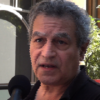"Mr. Assange shared much of the material at issue with The New York Times and other news organizations. The resulting stories demonstrated why the protections afforded the press have served the American public so well; they shed important light on the American war effort in Iraq, revealing how the United States turned a blind eye to the torture of prisoners by Iraqi forces and how extensively Iran had meddled in the conflict."
The New Yorker's Masha Gessen, wrote: "The use of the Espionage Act to prosecute Assange is an attack on the First Amendment. ... It stands to reason that an Administration that considers the press an 'enemy of the people' would launch this attack. In attacking the media, it is attacking the public."
MSNBC's Rachel Maddow, the Democratic Party booster, who probably had more influence than any commentator in drumming up the Russia-gate conspiracy theory and Assange's alleged role in it, launched into an astounding defense of the imprisoned publisher. On her program she said:
"The Justice Department today, the Trump administration today, just put every journalistic institution in this country on Julian Assange's side of the ledger. On his side of the fight. Which, I know, is unimaginable. But that is because the government is now trying to assert this brand new right to criminally prosecute people for publishing secret stuff, and newspapers and magazines and investigative journalists and all sorts of different entities publish secret stuff all the time. That is the bread and butter of what we do."
Victim of Disinformation Campaign
Assange has been the victim of an effective, mass disinformation campaign, planned as long ago as March 8, 2008 when a secret, 32-page document from the Cyber Counterintelligence Assessment branch of the Pentagon described in detail the importance of destroying the "feeling of trust that is WikiLeaks' center of gravity."
The document said: "This would be achieved with threats of exposure and criminal prosecution and an unrelenting assault on reputation."
"It was as if they planned a war on a single human being and on the very principle of freedom of speech," Pilger said in 2018 (video above).
As a result, a number of falsehoods about Assange's story are deeply entrenched in the media and the public and are resistant to correction with facts.
1. Assange is not a journalist.
Most establishment journalists do not consider Assange to be one of them. First, he is completely a product of the Internet Age, a medium as revolutionary as the printing press, radio and television. His journalism is of a different type than traditional reporting.
Second, WikiLeaks publishes entire documents, rather than reporting extensively on them. In the past newspapers, such as The New York Times, published several pages in print editions of major documents, such as the top secret Pentagon Papers and today provide whole documents online.
Assange is not simply a clerk receiving documents and posting them online without studying any of them. He has engaged in their authentication and has a profound understanding of their contents and newsworthiness. Assange has given countless interviews and speeches, authored three books, edited and co-written two others, and written dozens of articles. Throughout he has displayed a deep understanding of geopolitics and the internal affairs of numerous nations.
Most importantly, Assange has had an adversarial relationship with power, something that is waning in establishment media. Because of that increasingly cozy relationship between journalism and power Assange has scooped major media, perhaps engendering a degree of professional jealousy.
His role as a journalist was affirmed by the numerous awards he has won, including The Economist's New Media Award (2008); Amnesty International's UK Media Award (2009); the Sam Adams Associates for Integrity in Intelligence award (2010); the Martha Gellhorn Prize for Journalism (2011, which Parry won in 2017); the Walkley Award for Most Outstanding Contribution to Journalism (2011, Australia's Pulitzer Prize), the Voltaire Award for Free Speech (2011), the International Piero Passetti Journalism Prize of the National Union of Italian Journalists (2011), the Jose Couso Press Freedom Award (2011); the Yoko Ono Lennon Courage Award for the Arts (2013) and the Galizia Prize for Journalists, Whistleblowers & Defenders of the Right to Information (2019).
In 2010, the New York Daily News listed WikiLeaks first among websites "that could totally change the news." No less of an authority than the founder of this site, one of America's best investigative reporters, said, "Journalists are all Julian Assange." And Parry gave this warning to establishment journalists: "By shunning WikiLeaks as some deviant journalistic hybrid, mainstream U.S. news outlets may breathe easier now but may find themselves caught up in a new legal precedent that could be applied to them later."
Next Page 1 | 2 | 3 | 4 | 5 | 6 | 7
(Note: You can view every article as one long page if you sign up as an Advocate Member, or higher).





